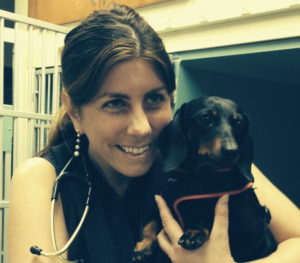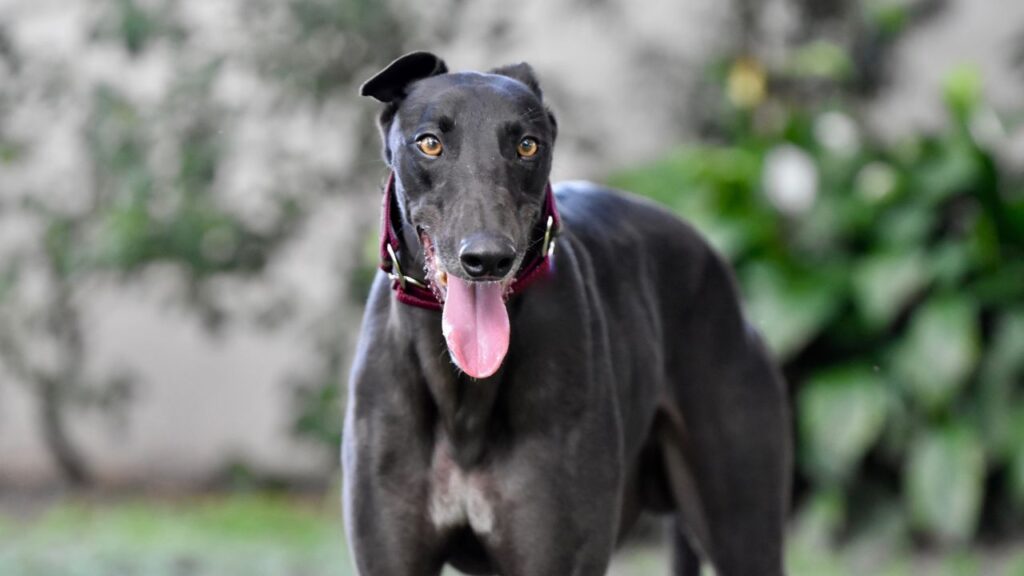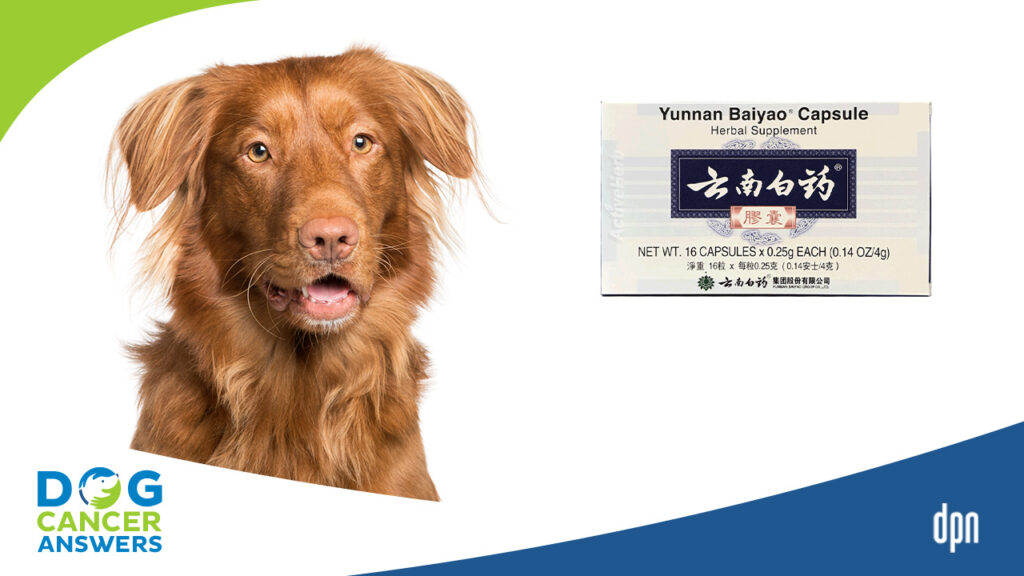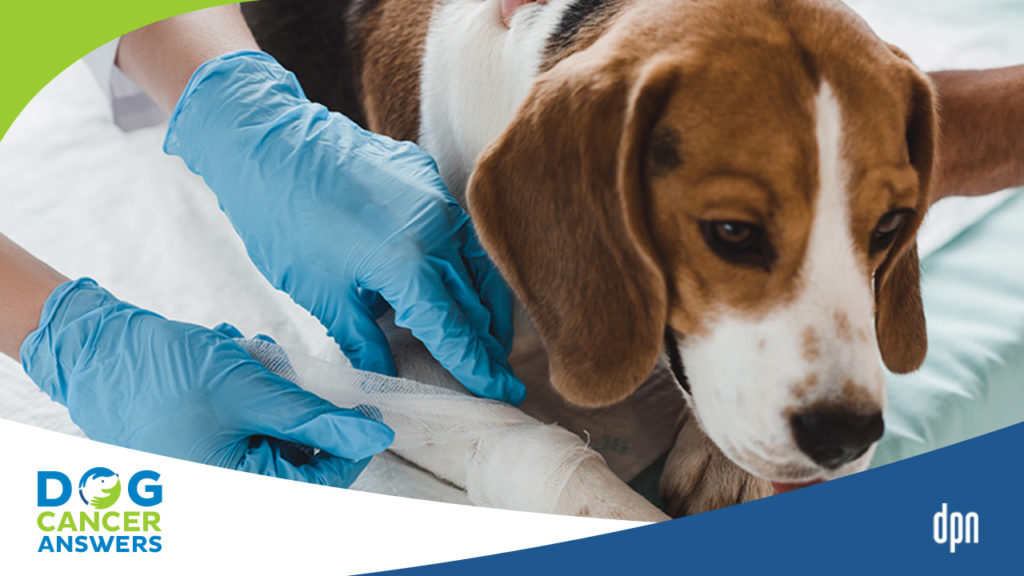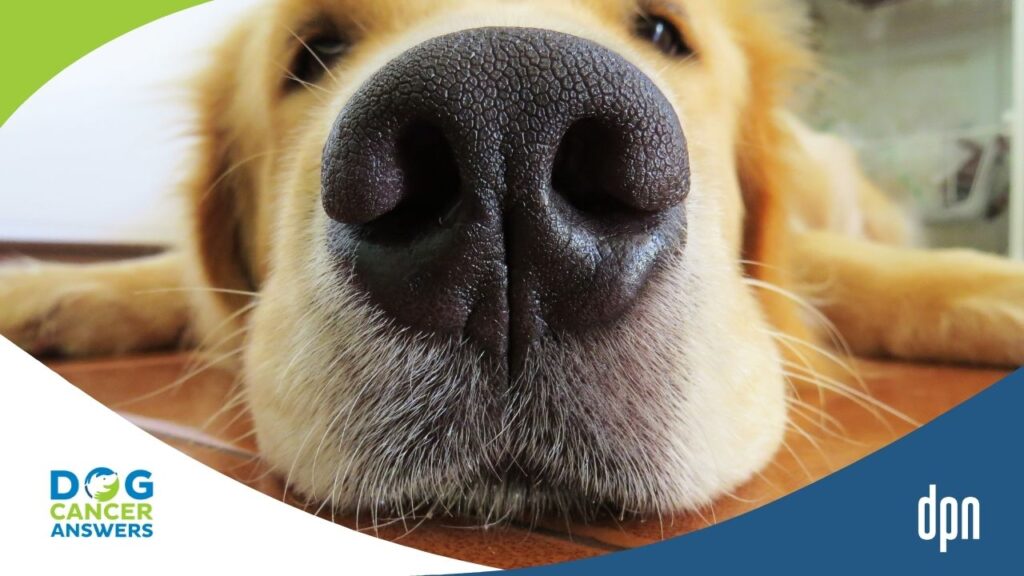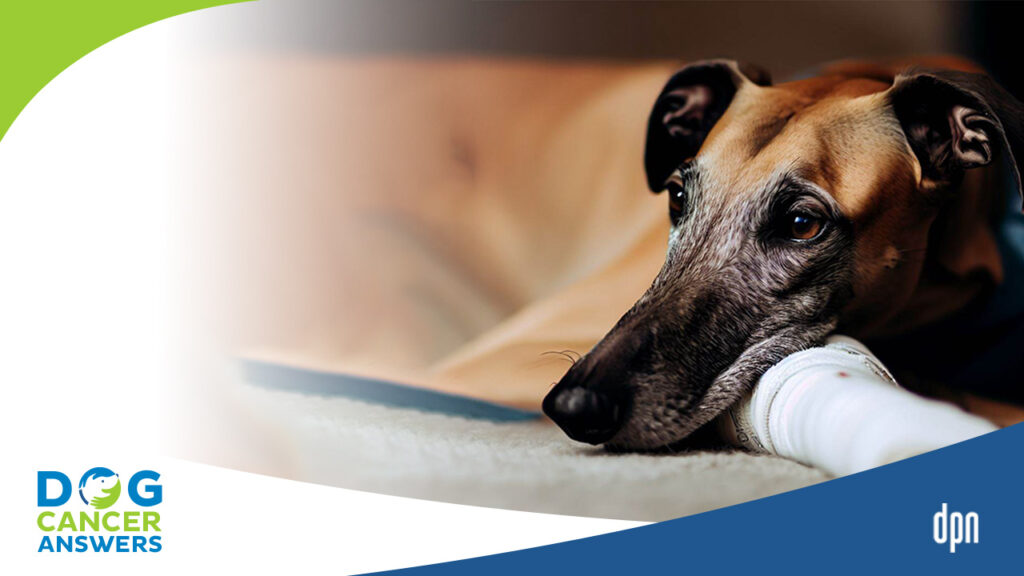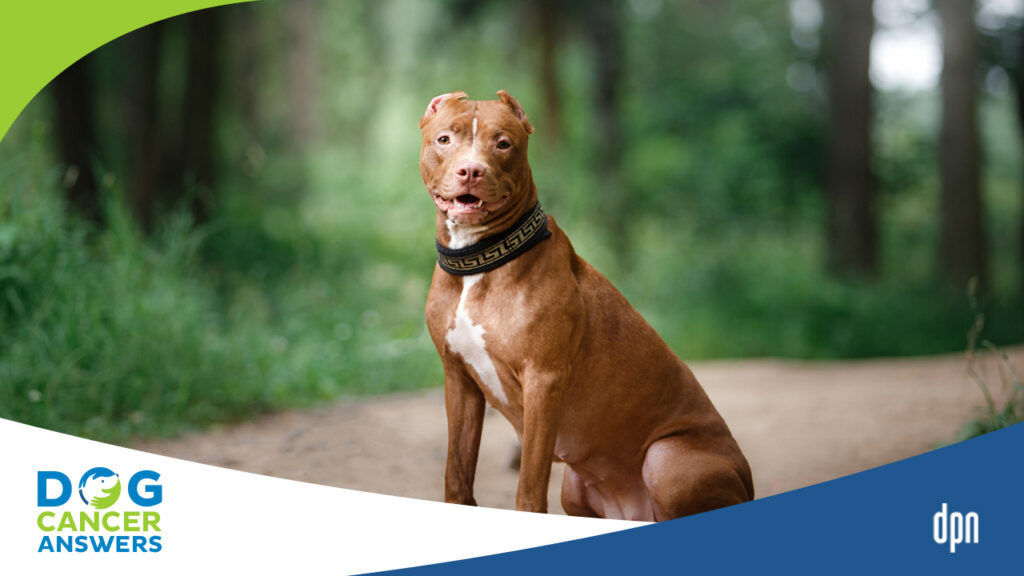EPISODE 197 | RELEASED January 2, 2023
Why Do Nose Tumors Bleed? | Dr. Brooke Britton
Dog nasal tumors are extremely fragile and frequently bleed. But why? Oncologist Brooke Britton explains.
SHOW NOTES
Nosebleeds are often the first thing a dog lover notices when their dog has a nasal tumor, and this horrifying symptom can continue even after treatment is started. Caller Holly wants to know why nosebleeds occur – is it the growth of the tumor causing destruction, or the tumor itself bleeding?
Veterinary oncologist Brooke Britton answers Holly’s question, and also explains how nosebleeds can be addressed. Unfortunately, sticking some tissues up your dog’s nose is NOT a good idea, and severe bleeds require a vet visit. But treating the cancer will help, and you might also be able to use the herbal supplement Yunnan Baiyao.
[00:00:00] >> Dr. Brooke Britton: Most nasal tumors also destroy bone. There are fine scrolls of bone within the nasal cavity of dogs, just like in people, called turbinates, and so that bone tends to get destroyed as we go from one nasal compartment to the other.
[00:00:19] >> Announcer: Welcome to Dog Cancer Answers, where we help you help your dog with cancer.
[00:00:25] >> Molly Jacobson: Hello, friend. Thanks for joining us today. We’re taking a listener line call from Holly. Holly is from the island of Kauai in Hawaii, and she has a senior dog with possibly nasal cancer. So let’s listen to her question now.
[00:00:43] >> Holly: Hi, my name is Holly. I’m calling from the island of Kauai. I have a senior dog with probable nasal cancer who has bled from both nostrils with one episode lasting about 26 hours off and on. What is the actual mechanism that causes the bleeding? Is it that the tumor grows and burst or is it irritated and then bleed? Thank you so much.
[00:01:13] >> Molly Jacobson: Joining us today is Dr. Brooke Britton to answer Holly’s question. Dr. Britton, thank you so much for joining us.
[00:01:21] >> Dr. Brooke Britton: Thank you for having me again.
[00:01:23] >> Molly Jacobson: So why do nasal tumors tend to bleed so much?
[00:01:28] >> Dr. Brooke Britton: Nasal tumors tend to bleed so much because the nasal cavity has a lot of blood vessels in it already supplying the nose. And they also tend to be highly vascular, meaning that they have many blood vessels that can form when the cancer develops to supply the tumor. And those blood vessels are typically very fragile and they tend to break very easily, and so they can bleed.
[00:01:53] >> Molly Jacobson: I see. So is this typical, Holly’s experience with her dog, of having the both nostrils bleeding at the same time and one for 26 hours? That would totally freak me out if my dog’s nose was bleeding for over a day.
[00:02:08] >> Dr. Brooke Britton: Yes. Um, it can be a very scary thing and it can happen out of just one nostril, but when it happens out of both nostrils, we often think that it’s either towards the back of the nose or it can be invading through the septum, essentially invading into both nasal cavity compartments. And so we can have bleeding out of both nostrils. And most nasal tumors also destroy bone. There are fine scrolls of bone within the nasal cavity of dogs, just like in people, called turbinates. And so that bone tends to get destroyed as we go from one nasal compartment to the other.
And we can also have the tumor invade into other parts of the dog’s face and up into, in severe cases, into the brain. At the back of the nasal cavity, there’s a, a thin boney plate that separates the brain from the back of the nasal cavity. And sometimes – and as we’re destroying bone and those structures, we’re eating through blood vessels as well, the tumor, as it moves along. And so there are many different, unfortunately, many different opportunities as the tumor expands for the tumor to bleed. So not uncommon for us to see that.
[00:03:29] >> Molly Jacobson: Okay. So her question about is it the tumor growing and then bursting, or is it just irritated, and your answer, it sounds like it could be both.
[00:03:37] >> Dr. Brooke Britton: Correct. The tumor itself can rupture, or pieces of the tumor can break off as parts of the tumor die. The blood vessels that supply the tumor can rupture, and the tumor can invade other blood vessels that are normal blood vessels supplying the face and the nasal cavity and can bleed that way.
[00:03:56] >> Molly Jacobson: So is there anything that Holly can do to prevent or reduce the amount of bleeding?
[00:04:04] >> Dr. Brooke Britton: That is often difficult to do at home. If there is a severe nasal bleed like her dog had unfortunately the other day, sometimes it can be very difficult or impossible to get the bleed to stop without going to see a veterinarian. I would not recommend, as we would if we got a nose bleed, usually we’re sticking a tissue up there and applying pressure.
I wouldn’t recommend sticking anything up the nostrils of a dog with a nose bleed, but you can apply ice or sort of a cool pack to the bridge of the nose and potentially a little bit of pressure, but most of the times it’s gonna be difficult to prevent a dog’s nose from bleeding. And if the nasal tumor is painful, a dog may not want you to touch their face or around their nose. Um, they may shake their head or sneeze.
And so holding your dog still and trying to stop a nose bleed is really hard to do. When we have a severe bleed like that, the recommendation is to go to a veterinarian’s office or an, an ER, especially if it’s after hours or in the middle of the night. If we’re bleeding a large amount for, you know, the better part of a day or more than a day, we can start to have significant blood loss through the nose.
So if it’s just little drops here and there, they certainly add up over time, but if we’ve got blood just dripping out of the nose for several hours, that is more of an emergency situation and should be handled by a vet.
[00:05:35] >> Molly Jacobson: Okay. What will they do at the vet in that case? How do they stop the bleeding and/or address – how do they help the dog?
[00:05:44] >> Dr. Brooke Britton: So sometimes they actually have to – it depends on how severe the bleed is, I’ve had dogs with very invasive nasal tumors where they’ve actually had, this is rare, but they’ve had to surgically tie off blood vessels.
[00:05:57] >> Molly Jacobson: Oh, wow.
[00:05:57] >> Dr. Brooke Britton: The carotid, for example, to stop the bleeding. Oftentimes, the vet’s office can do things safely. They may plug the nose, but they can do it in a way that’s safe that we, you know, sometimes, again, people doing it at home, it’s very difficult for them to safely manage that. But mostly if a tumor is eating through the nasal cavity and causing a severe bleed, treating the tumor if that’s possible, or sometimes using things like radiation therapy, which obviously requires an oncologist, have to be used to get the nose bleed to stop.
If the tumor is a certain type of tumor, that is lymphoma or mast cell tumor, or even some of the solid tumors like carcinomas or sarcomas, sometimes we’ll put a dog on an anti-inflammatory like prednisone or perhaps a different type of anti-inflammatory, sometimes an NSAID, although it depends on the situation. And sometimes taking down that inflammation can slow the bleeds or lessen them, or it may stretch out the interval in between bleeds.
But again, that’s something that shouldn’t just be started at home. That’s done on the advice of a a veterinarian. And it’s not always an appropriate thing to do. So it depends on the dog.
[00:07:12] >> Molly Jacobson: It depends on the dog and the case and what they see when you bring your dog in. There’s no one size fits all solution to these things.
[00:07:20] >> Dr. Brooke Britton: Absolutely.
[00:07:21] >> Molly Jacobson: Let’s take a short break here and then we’ll be right back.
And we’re back with Dr. Brooke Britton. I know that there are gonna be some listeners who think is this time for Yunnan Baiyao, that Chinese herbal preparation that seems to help with blood clotting. Is that something that you would consider with your vet?
[00:07:41] >> Dr. Brooke Britton: Sometimes I do. A disclaimer about Yunnan Baiyao is that it is a proprietary mix of ingredients that we don’t truly know exactly all of what’s in it. Yunnan Baiyao is a supplement, and just like any other supplement that you or I might take, it’s unregulated. And oftentimes it’s shipped over from China, we don’t know exactly what is in the capsule of Yunnan Baiyao or that there’s consistency between the lots of Yunnan Baiyao that are produced.
That said, the majority of dogs that I’ve used it in seem to tolerate it generally well. There’s risk to any supplement or any medication, but if we’re in a situation where we’re having a bleed that we can’t stop, it is possible to give Yunnan Baiyao orally as a capsule in an attempt to stop or lessen the bleeding. I wouldn’t recommend doing this at home, but at a veterinarian’s office, occasionally we will open the capsule and put the powder on gauze and pack gauze with it to try to stop the bleeding up the nose. But again, that is not something I would recommend trying at home.
[00:08:53] >> Molly Jacobson: No, because that’s such a, I mean, nasal tumors are so sensitive and they’re so bloody.
[00:08:58] >> Dr. Brooke Britton: Yeah.
[00:08:59] >> Molly Jacobson: I assume you’re using some sort of guided imaging when you do that, you’d know what you’re looking – you can see things that we can’t see from the outside. And so there’s ways – you guys know the anatomy, but I’m not capable of sticking something, anything, up my dog’s nose and knowing that I’m not gonna hurt my dog, so.
[00:09:15] >> Dr. Brooke Britton: Right. I would not recommend putting anything up the nose, cotton balls, gauze, q-tips, anything up your dog’s nose at home for any reason. Even if the blood has stopped and you see a little blood clot or something that you just wanna swipe away.
Umm if the dog has a good functioning immune system and their platelets are able to clot, eventually many times the bleeding will stop, but when we have a tumor or a ruptured blood vessel that keeps bleeding and bleeding and bleeding, sometimes it’s very difficult, if not impossible, to stop the bleeding without more significant medical intervention.
So, when in doubt I wouldn’t touch things at all, especially around a bleeding nose and a dog at home.
[00:09:59] >> Molly Jacobson: Yeah.
[00:09:59] >> Dr. Brooke Britton: You know, again, if your dog is calm and the bleed is there, putting a kind of a cool compress or an ice pack over there is not unreasonable, but it’s hard to know if that’s really going to help. Oftentimes a veterinarian needs to be involved if there’s a severe nose bleed.
[00:10:16] >> Molly Jacobson: Yeah, that makes sense. Well, thank you so much Dr. Britton. I really appreciate you joining us today.
[00:10:22] >> Dr. Brooke Britton: My pleasure. Absolutely. Thank you.
[00:10:26] >> Molly Jacobson: And thank you, listener. If you have a question for us like Holly did, please give us a call. Call our Listener Line at (808) 868-3200. That’s where you can leave your question as a message, and hopefully it will inspire a future episode. Another fabulous resource to ask about how other dog lovers handle issues like nosebleeds and other problems you didn’t know you needed to know about, is our Facebook group.
You can join our Facebook group Dog Cancer Support by searching for it on Facebook or going to dogcancersupport.com. That’s where we’re all sharing in the highs and lows of loving a dog with cancer.
I’m Molly Jacobson, and from all of us here at Dog Podcast Network, I’d like to wish you and your dog a very warm Aloha.
[00:11:22] >> Announcer: Thank you for listening to Dog Cancer Answers. If you’d like to connect, please visit our website at dogcanceranswers.com or call our Listener Line at (808) 868-3200. And here’s a friendly reminder that you probably already know: this podcast is provided for informational and educational purposes only. It’s not meant to take the place of the advice you receive from your dog’s veterinarian.
Only veterinarians who examine your dog can give you veterinary advice or diagnose your dog’s medical condition. Your reliance on the information you hear on this podcast is solely at your own risk. If your dog has a specific health problem, contact your veterinarian. Also, please keep in mind that veterinary information can change rapidly, therefore, some information may be out of date.
Dog Cancer Answers is a presentation of Maui Media in association with Dog Podcast Network.
Hosted By
SUBSCRIBE ON YOUR FAVORITE PLATFORM
Topics
Editor's Picks
CATEGORY
